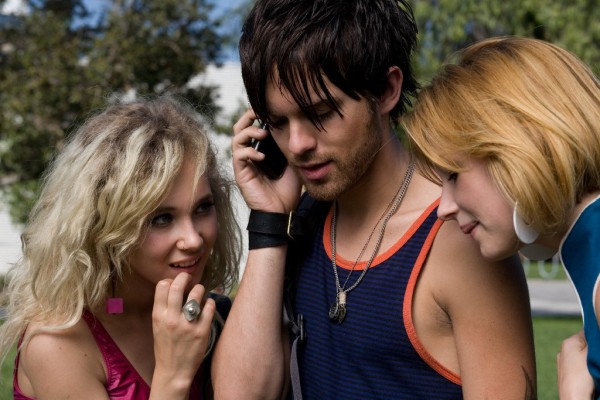Culture
Review: Kaboom

Kaboom is the weirdest, craziest, trippiest, balls-to-the-wall, “what the hell am I watching,” all out, non-stop, funny, messy, visionary and delightfully off-center film that you’ll see this year. Period.Writer/director Gregg Araki’s new movie is sort of a mix of Donnie Darko and Twin Peaks, and although it doesn’t quite measure up to either of them in the end, it does succeed in taking the fundamental strangeness of both even further.
The film tells the story of a (mostly) gay college freshman named Smith (Thomas Dekker). Coming home from a party one night, Smith thinks he sees a girl get murdered, but can’t be sure, since he’s under the influence of psychotropic drugs. Following the incident, Smith gets wrapped up in an intricate web involving cults, witchcraft, and conspiracies, all of which may or may not lead to the end of the world. Of course this is all interspersed with the many sexual trysts of Smith, who goes around sleeping with women and men alike. When he’s not having sex or worrying about conspiracies, Smith spends most of his time hanging out with his best friend Stella (Haley Bennet) and a mysterious new bed-buddy named London (Juno Temple).
Themes of sexual exploration are nothing new to Araki, whose other youth-centered films include the likes of Mysterious Skin and Splendor. However, everything is heightened in Kaboom. It’s crazier and sexier and all-around more fun than many of his other movies. Like Donnie Darko, it relies heavily on a sense of dread, enforced in large part by a great soundtrack, with some particularly choice cuts from the ‘80s. And like Twin Peaks, it puts a simple mystery in front of us (once again, the case of a murdered girl) and transforms it into something profoundly complicated and surreal.
The movie even looks like a mix between a bad trip and a scary dream; shot on the RED camera, this is Araki’s first film in digital, and he takes the opportunity here to reap the benefits of his chosen technology, inserting plenty of effects that are borderline cheesy yet still mostly effective. In fact, the whole thing has a sort of strobe-lit look to it, and you may find yourself questioning whether there’s something wrong with the projector for the first fifteen minutes or so of the movie. The cast of sexy youngsters is also quite good, buying into the insanity of the film so much so that the audience in turn believes it too.
But Kaboom has two flaws, one minor and one major. The minor flaw is that the more Araki piles on to the plot, between elaborate prophecies and kids with supernatural powers, the more the film starts to feel strained underneath the giant weight of its many elaborate twists. The major flaw is the ending, not in terms of content but in terms of pacing. The movie leads you to believe that it’s heading toward something big, only to stop abruptly, leaving you wanting something, anything more. It’s impossible to say that Araki didn’t have a bold vision, and clearly he saw that vision through to its fullest extent. Whether it paid off or not is hard to say, but ultimately it’s still worth taking the trip, because Kaboom is just too ridiculous to be ignored.
2.5/4 Stars